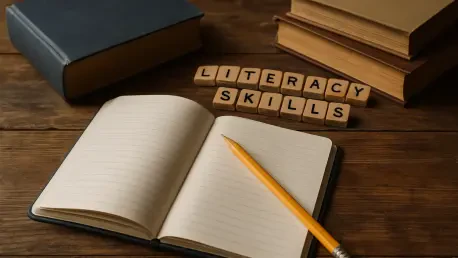In an era where digital platforms are flooded with information, distinguishing fact from fiction has become a daunting challenge for many, especially young people navigating social media and news outlets. Misinformation spreads rapidly, often outpacing efforts to correct it, and the consequences can be profound, influencing public opinion and even democratic processes. A staggering number of students lack the critical skills needed to evaluate sources, a gap that threatens to perpetuate cycles of distrust and confusion. Addressing this pressing issue requires more than individual effort; it demands a collaborative approach that brings together diverse stakeholders. One organization stands at the forefront of this battle, forging partnerships to equip the next generation with essential tools for discerning credible information in an increasingly complex media landscape.
Building Educational Foundations
Empowering Schools with Digital Tools
A significant stride in fostering news literacy begins within the walls of schools, where integrating specialized resources can shape students’ critical thinking abilities from an early age. The News Literacy Project (NLP) has developed Checkology®, a free e-learning platform designed to teach students how to evaluate information sources effectively. This tool is accessible in 95 of the 100 largest U.S. school districts through Clever, a digital learning system that streamlines access with single sign-on capabilities. Beyond ease of use, Checkology® offers features like NicklPass, which removes paywalls from reputable news websites, ensuring students engage with high-quality journalism without barriers. This initiative reflects a strategic effort to embed news literacy into curricula, providing educators with a practical means to address misinformation directly in the classroom and prepare students for real-world challenges.
Supporting Teachers through Professional Development
Equipping educators with the right skills and resources is just as crucial as providing tools for students, as teachers play a pivotal role in guiding young minds through the information maze. NLP supports this by offering free professional development opportunities, including webinars and events hosted on platforms like edWeb.net, a professional learning network. These sessions focus on best practices for teaching news literacy, helping educators integrate critical thinking exercises into their lesson plans. Additionally, partnerships with school districts facilitate district-wide adoption of news literacy programs, ensuring a consistent approach across grade levels. By investing in teacher training, the organization ensures that the fight against misinformation is not a fleeting effort but a sustained movement, empowering educators to foster a culture of inquiry and skepticism toward unverified claims among their students.
Extending Impact Beyond the Classroom
Engaging Families and Community Groups
The battle against misinformation cannot be confined to school settings alone; it must extend into homes and local communities where young people spend much of their time. NLP recognizes this need and provides tailored resources for families to spark meaningful conversations about media consumption and source credibility. Workshops and guidance materials help parents reinforce critical thinking skills at home, creating a seamless learning experience. Furthermore, collaborations with libraries, after-school programs, and other community organizations offer customized training for staff and volunteers, alongside free access to Checkology®. A directory of over 100 volunteer journalists also supports these efforts by bringing authentic insights into community programming, ensuring that news literacy becomes a shared value across diverse settings and amplifying its societal impact.
Collaborating with Media Professionals
Partnerships with journalists and news organizations are vital in lending credibility and real-world context to news literacy initiatives. NLP works closely with local and national newsrooms to provide expert perspectives on journalistic standards, helping to demystify the news-making process for students and the public. High-profile collaborations, such as those with major media entities during National News Literacy Week, significantly boost visibility for these efforts. These partnerships ensure that trusted voices counteract misinformation by highlighting the importance of reliable reporting. Importantly, the educational resources remain independent, focusing on teaching evaluation skills rather than promoting specific outlets, which maintains a balanced approach. This alliance with media professionals underscores the shared responsibility of fostering an informed society, bridging the gap between journalism and education.
Reflecting on Collaborative Success
Lessons from Unified Efforts
Looking back, the journey to combat misinformation through news literacy revealed that no single entity could tackle this challenge in isolation. The partnerships forged by NLP with educators, families, community groups, and media professionals created a robust network that amplified the reach and depth of educational initiatives. Programs like Checkology® became cornerstones in schools, while community engagements ensured that learning persisted beyond classroom walls. Media collaborations during key campaigns elevated public awareness, demonstrating the power of collective action. Each partnership brought unique strengths, from practical tools in education to authentic voices in journalism, weaving a comprehensive fabric of support that addressed misinformation from multiple angles and built a stronger foundation for critical thinking.
Future Pathways for Broader Impact
As the fight against misinformation evolved, it became evident that sustained collaboration was essential for long-term success. Moving forward, expanding access to digital tools in underserved areas emerged as a critical step to ensure equity in news literacy education. Strengthening ties with community organizations offered a way to reach diverse populations, while deeper media partnerships promised to keep the public engaged through innovative campaigns. Encouraging policymakers to prioritize news literacy in educational frameworks also stood out as a necessary advancement. These strategies, built on the groundwork laid by past efforts, pointed toward a future where critical thinking skills became a universal asset, equipping society to navigate the digital information landscape with confidence and clarity.









